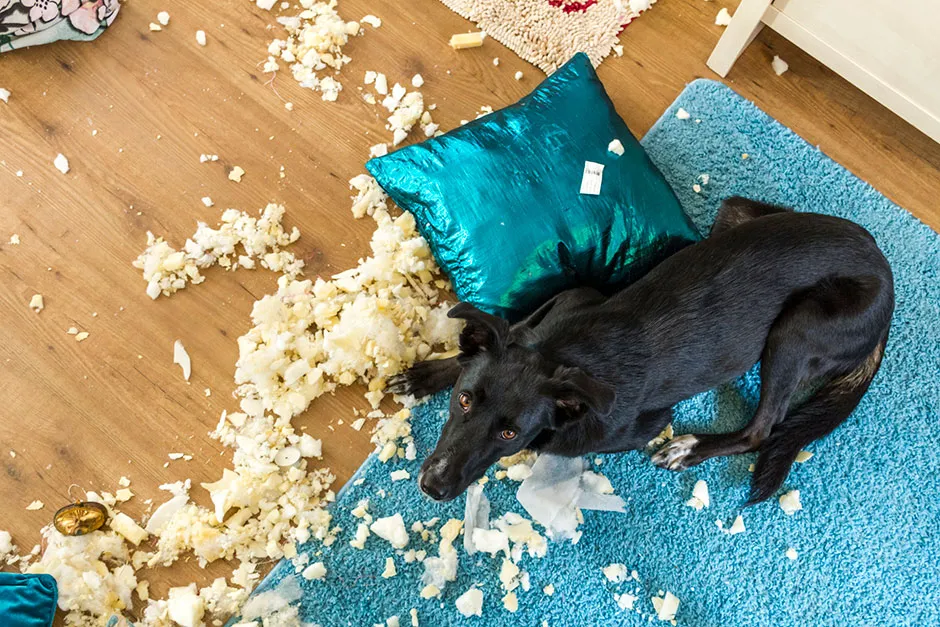Dogs love to spend time with their human family. So much so that we usually have to actively teach them as puppies that it’s really going to be okay if they are not with us every minute of the day.
How will our dogs that have got used to us being around all the time going to cope when we go back to the office without them? Will they have unlearned the lessons from puppyhood about being left along and suffer from separation-related distress? What can we do for them to help them adjust to another dramatic change in daily routine?
The answer to the first question depends on the individual dog. Some dogs have been prone to separation-related distress in the past, and for those dogs, a change from nearly always having their humans around back to rarely having their humans around is likely to rekindle their distress at being left alone.
Another subset of the companion dog population are prone to general anxiety. That may manifest in a variety of ways such as excessive barking, fearfulness, aggression, self-harm, and other less obvious problem behaviours. These dogs may or may not have shown separation-related distress in the past, but any large and sudden change in their daily routine is likely to cause them significant distress.
Some of these dogs may have been difficult at the beginning of lockdown, being unusually noisy, destructive, disruptive or needy as a response to suddenly having humans around all the time.
Lastly are the dogs that were acquired during lockdown, either as a puppy or an adult dog, and have never known life in your home where they have been left alone for extended periods.
Read more about dogs:
Dogs are keenly aware of contrasts in their environment, so a period where humans are nearly always present in the home contrasts sharply with a period where they are suddenly away from home for most of the day, and that alone can be enough to be disruptive and challenging for them to cope with. So even if you have a well-adjusted dog that was easily taught to accept alone time when you got them and has never since shown any sign of separation-related distress, they still may struggle with an abrupt change in routine.
Understanding why an end to lockdowns may cause problems for our dogs empowers us to find sensible interventions ahead of lockdown ending. The most likely cause of trouble is a sudden and dramatic change in living circumstances. Therefore, we can prime our dogs for a return to the office and simultaneously get an idea of how problematic this is going to be for them by starting with short absences and using a webcam or security camera to see how our canine pal is handling being alone.
If they spend more than 20 minutes pacing, vocalising, drooling, panting (assuming it’s not hot), or directing destructive behaviours at doors or windows, then it looks like we have a serious problem and you should speak to your vet about medication to assist. We don’t want them miserable and they don’t need to be.

If they can go and lie down and nap soon after being left, then try a longer absence if you can. Even if all that you can manage is several absences of less than 30 minutes in a day, this will still act to ease your dog into post-lockdown life where you won’t be around so much.
Another way to ease a dog into human absences is to make sure they are relaxed about being left to amuse themselves while you move around the house. This can be achieved with long-lasting chew items such as boredom buster toys or a bone. The goal is to see your dog comfortably sticking with their chew item while you get up and leave the room. You may need to start small – just standing up and then sitting down beside them again.
A lot of humans struggle with sudden and dramatic changes as well, so as we move towards what we call “normality”, we should appreciate that our own sense of what is normal has changed and we have longer memories than dogs do.
Many humans appreciate big changes to be incremental in nature, and dogs are just the same. We have the opportunity to create these conditions for them, even if it takes some creativity, so do them a favour and think how to achieve gradual changes for them.
Visit the BBC's Reality Check website at bit.ly/reality_check_ or follow them on Twitter@BBCRealityCheck